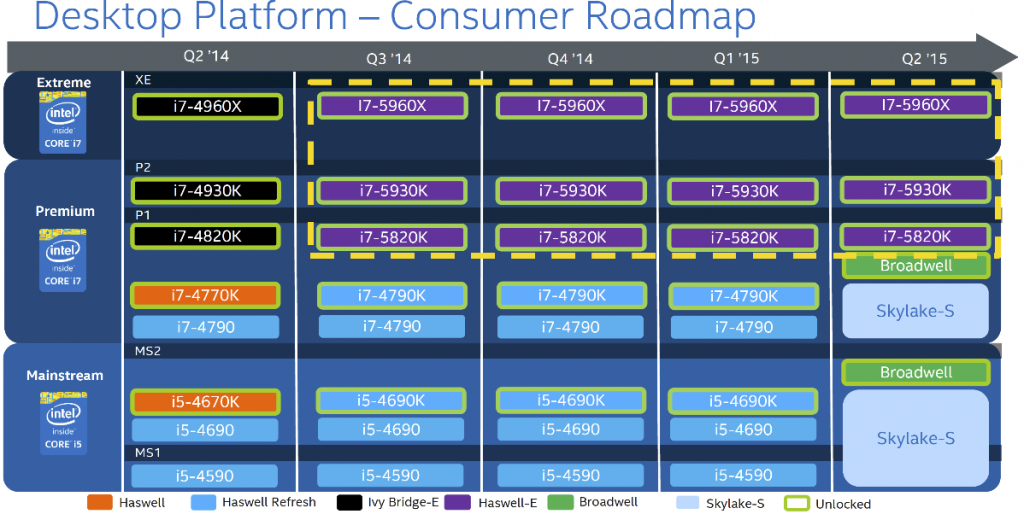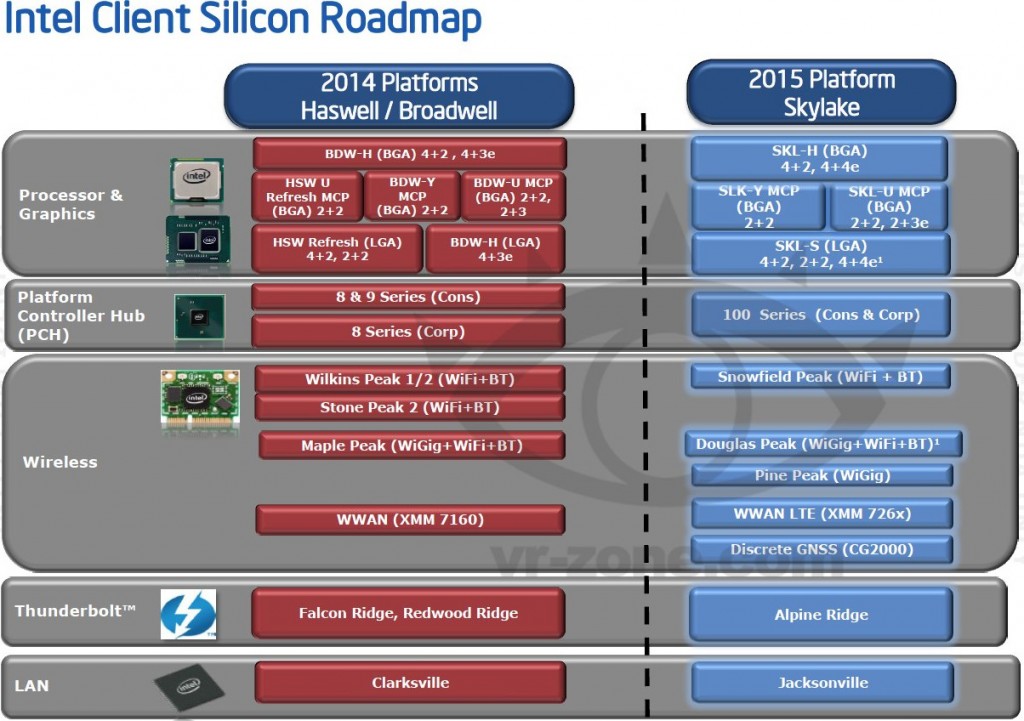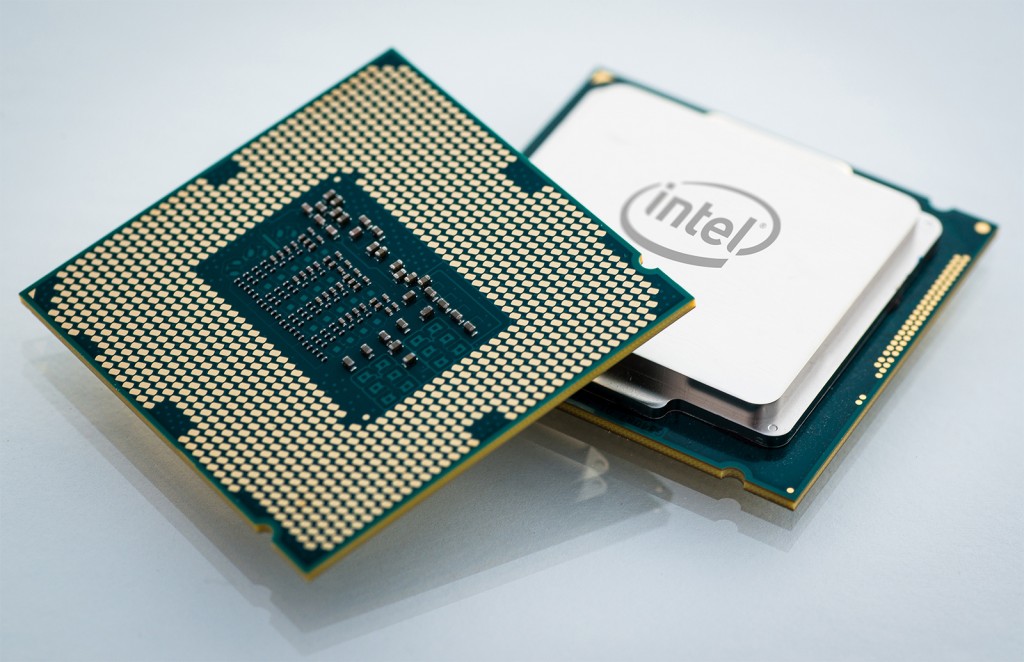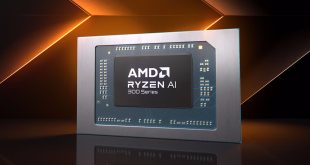Just a week ago Intel Corp. said that it would not postpone introduction of its code-named “Skylake” microprocessors in a bid to sell-off the remaining inventory of current-generation chips. However, a source with knowledge of Intel’s plans revealed on Friday that the world’s largest chipmaker will delay commercial launch of its future CPUs by about one quarter.
Intel has always said publicly that it would ship its “Skylake” processors in the second half of 2015. However, for a number of times last year the company demonstrated in its confidential documents and presentations for partners that it intends to release the first “Skylake” central processing units for desktops in the second quarter of 2015. Back in early November, 2014, Intel showcased a slide at its technology conference for partners indicating that the first “Skylake” chips in LGA1151 form-factor along with Z170 and H170 platforms will hit the market in the first half of the year (i.e., Q2 2015). This will not happen, despite of claims made last week.
A source with knowledge of Intel’s plans said that the chipmaker will delay commercial launch of the “Skylake” processors to the third quarter of 2015. Traditionally Intel released new microprocessors in the first half of the year (it did so with Westmere, Sandy Bridge, Ivy Bridge, Haswell and Haswell Refresh), but this time the company will not ship its new chips earlier than sometimes in Q3 2015. Moreover, makers of mainboards and high-performance PCs may not even get commercial “Skylake” CPUs to showcase their latest products at the Computex Taipei trade-show in early June.
The reasons for the delay are unclear. Moreover, given the fact that Intel is ramping up production of chips using 14nm process technology, it is relatively easy for the company to start volume production of processors based on the code-named “Skylake” micro-architecture. All Intel has to do, at least in theory, is to change photomasks in the scanner.
“[Broadwell and Skylake] are on the same technology, the same piece of silicon, the same factory,” said Brian Krzanich, chief executive officer of Intel, during a conference call with investors and financial analysts. “All we [need to] do is change the piece of glass in the scanner to get a different product. There is not a change or revamp of our factories that needs to occur for this.”

While the delay of the “Skylake” central processing units will postpone introduction of certain new platform features, this may actually be good for makers of motherboards. The co-existence of Intel’s “Broadwell” and “Skylake” microprocessors on the market this year was expected to result in availability of five competing types of platforms for Intel’s desktop central processing units. For makers of motherboards this means increased costs and internal competition. If Intel helps its partners to sell through their existing chips and mainboards based on previous-generation chipsets, the slight delay could be a good thing for them.

Intel’s “Skylake” platforms will offer all-new CPU micro-architecture (with AVX 3.2, 512-bit extensions and so on), native SATA Express support (which means they will support advanced SSDs with 2TB/s or even 4TB/s read speeds), Thunderbolt 3.0 (40Gb/s) and DDR4 memory option. Unfortunately, they will not offer overclockability since Intel has no intentions to launch Skylake processors with unlocked multiplier in Q3 2015. By contrast, Intel’s “Haswell-K” and “Broadwell Unlocked” will offer overclockability, but will not provide native SATA Express support and will continue to use DDR3 memory.
Back in November, 2014, it was reported that Intel had set the “ready to ship” schedule for the mainstream “Skylake” processors (Skylake-H, Skylake-U) for notebooks to the 37th – 47th weeks of 2015 (early-September – mid-November). If the information is correct, then the first laptops based on the mainstream “Skylake” processors will hit the market in late-September at the earliest. Mobile platforms featuring “Skylake” chips will sport wireless charging, WiGig and other technologies, which will boost demand for new tablets, 2-in-1s and notebooks.
Intel did not comment on the news-story.
Discuss on our Facebook page, HERE.
KitGuru Says: In the light of recent delays of Intel’s “Broadwell” CPUs by about a year, the postponement of the company’s “Skylake” processors by a quarter does not seem dramatic. Still, it is rather alarming to see how Intel adjusts its plans…
 KitGuru KitGuru.net – Tech News | Hardware News | Hardware Reviews | IOS | Mobile | Gaming | Graphics Cards
KitGuru KitGuru.net – Tech News | Hardware News | Hardware Reviews | IOS | Mobile | Gaming | Graphics Cards




They shouldn’t have released Z97 in the first place. Now look at what’s happening, the same product on different chipsets in one year. This isn’t cheap for anyone by any means, it’s just intel saving face again.
Even if they delayed the chip AMD is still left behind far far away…
sooooo….Intel going to launch two product lines the same year, broadwell (presumably) a little refresh of something we already have on market and then launch some months later skylake something more likely to a full fledged upgrade thanks to the new motherboards, and they pretend to buy both…. maybe amd wasn´t putting enough threat but it doesn´t mean that we have to buy everything they throw at our faces….
“if Intel helps its partners to sell through their existing chips and mainboards based on previous-generation chipsets, the slight delay could be a good thing for them…”
it seems the obvious needs stating , intel can sell as many millions (minions) of chips to their industrial partners, but at the end of the day its the end (OEM/self build etc) consumer that pays the price, and so i ask ,where is the incentive to buy the die shrink broadwell in 2015, when you can have the real 2015 intel chip with updated SIMD AVX 3.2, 512-bit extensions and increased internal data throughput interconnects etc…. in skylake, there is no incentive to spend here at the existing price points.
its like the current contra (bankroll a [n industrial] customer’s product,except the real end users don’t want crap antiquated intel socs here for the price) intel low power crap x86 SOCs/chips without AVX/2, hardware assisted video encode/decode etc intel are flooding the android markets, there’s lot of cheaper x86 android devices right now, but the real end users are not buying these in significant numbers ,hence the even heavier write down on this junk than intel expected…
So in your other article, the guy says that “The company will start volume shipments of its new CPU’s, as announced, in the second half of 2015.”
Yet this article you say they delayed it till the second half of 2015.. Good journalism! 🙂
AMD has had a series of bad years for them, with budget cuts on R&D on the way.
I don’t think that saves them anyway, hopefully a wonderful buyout from Samsung will happen.
It’s a win for AMD investors with promising technology for Samsung.
You should consider the date of the articles was published…
LGA1151? and I’m sitting here with my 1155
AMD isn’t competing so Intel wants to delay Skylake as long as possible to try to make some money off of Broadwell.
Also, by saying Broadwell and Skylake would ship much sooner than they actually did, Intel was able to convince potential AMD buyers to wait, making AMD chips look even longer in the tooth.
Still doesn’t take away the fact that they already mentioned before that they arrive in second half of 2015, while this article says they are delayed till second half of 2015..
So first they get confirmation they get released on that date, and suddenly the next article says that the same date is a delayed date.
I know, logic thinking is hard huh.
So you mean I lacked logic? A pot calling the kettle black.
“I know, logic thinking is hard huh.” So it’s hard for you? LOL…
They did include this quote in the article:
“[Broadwell and Skylake] are on the same technology, the same piece of silicon, the same factory,” said Brian Krzanich, chief executive officer of Intel, during a conference call with investors and financial analysts. “All we [need to] do is change the piece of glass in the scanner to get a different product. There is not a change or revamp of our factories that needs to occur for this.”
So, Broadwell is definitely not another Haswell refresh on 14nm, it is almost the same thing as Skylake with the exception of DDR4 support and being on LGA 1150 instead of 1151. If I was building a PC, though, I do not see any reason to go Broadwell over Skylake unless I was upgrading from a Haswell PC with a 9-series motherboard… and how many people will actually do that? I doubt that figure would even be close to 5%. On paper, it would have made more sense to completely skip over Broadwell and just go straight to Skylake later this year. OR, keep the LGA 1150 socket and use Haswell, Broadwell AND Skylake on it and make the 9-series boards both DDR3 and DDR4 compatible. There is no reason why Intel couldn’t have chosen to do something like that, since, you know, they are the same piece of silicon and everything.
I bet they delayed them to replace the CPU plate with a weaker plate to allow it to warp over time. Yet they messed up and made it too weak! I suppose they hate the fact that a old first gen i5 can still run modern high end graphics cards, So now they want to make them break over time, so people have to buy new, even if they don’t need it. Friggin marketing team scum bags!
No a buyout from a bigger corporation is not good! AMD staying AMD and improving is what people need! When the bigger corporations take over the customer always loses! Besides despite the re-brands, AMD still has excellent graphics cards at better prices than Nvidia. It’s only their CPU’s that have failed to deliver matched performance to their competition. However their is still nothing wrong with a AMD CPU when it comes to gaming. Once overclocked they match Intel’s single core speed. Also they provide many people with a strong price/performance solution. It’s more or less the stigma from some reviewers that turn people away. And then novice builders end up buying a lower performing Pentium or i3 instead. I only hope AMD comes up with something good. If they do I will buy one for a DDR4 build over Intel’s Skylake. But until then I am sticking with my IvyBridge, To me DDR4 is not worth risking money over a warped chip!